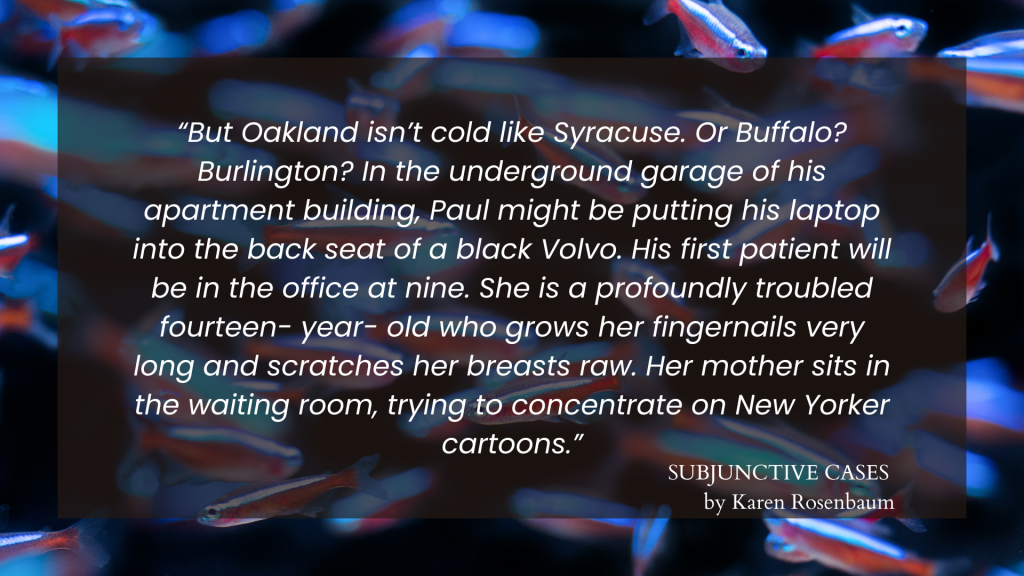Articles/Essays – Volume 57, No. 04
Subjunctive Cases
Laurie zips up her red jacket and curses God and Dennis. Except God probably doesn’t exist. Dennis exists. He is right in this moment existing in their bed while she is dragging the recycling and garbage cans out to the curb. It is dark. It is cold.
But Oakland isn’t cold like Syracuse. Or Buffalo? Burlington? In the underground garage of his apartment building, Paul might be putting his laptop into the back seat of a black Volvo. His first patient will be in the office at nine. She is a profoundly troubled fourteen-year-old who grows her fingernails very long and scratches her breasts raw. Her mother sits in the waiting room, trying to concentrate on New Yorker cartoons.
In the refrigerator of Paul’s kitchen are a dozen eggs minus three, a container of yogurt, two cartons of Indian takeout.
In the living room is a treadmill where Paul can walk and read Richard Dawkins at the same time.
On the way to work, Laurie worries about her father who has pancreatic cancer and her mother who has faith that prayers will heal him. And if the prayers don’t heal him, her mother has faith that they will one day be reunited in a white frame house in heaven.
Laurie is glad that her mother’s faith will see her through. Laurie herself has a hollow feeling whenever she thinks about her father dying. When did she last believe some force might intervene to expunge malignant tumors, not to mention the suffering from raw divorces and abuse and addiction? And famine and war and earthquakes and terrorist attacks? Some power that would ease the burden of one broken family and country, but maybe not another. In high school, she didn’t worry so much about the “anothers.” In college, she thought about them more.
Instead of prayers, she tries to recite things she is grateful for. She is grateful that while she is in the classroom, she can’t think about her father in Phoenix, his legs now paralyzed from the celiac plexus block. She can only think of Debbie and David and LeShaun and Carmelita. She loves the children. She is a good teacher.
So why not have children of your own, her mother demanded. You and Dennis are so selfish. It’s just so you can travel, take all those backpacking trips.
When Laurie turned forty, her mother stopped saying that. Aloud.

Paul is probably not selfish. He and—maybe her name is Marilyn—have released three children out into the world. Paul has always had answers. Questions too, but answers. For life. For patients. He and Marilyn might live in a two-story house in the suburbs and attend church and volunteer at the youth shelter. After Paul drives his dented gray Corolla over to the Baltimore clinic, Marilyn tells the cleaning lady what sheets to put on their bed, and then she takes the station wagon, which has car seats for the grandchildren, to the meeting of the compassionate service committee.
It’s four o’clock, and her classroom is empty—of children. Laurie straightens the book table and checks the computers to make sure they’re shut down. She sweeps up under the sand tray. Tomorrow’s word games are in a tidy stack on her desk. She slips the children’s paragraphs into her briefcase, sinks into her chair, and phones her mother.
“I wish you were here,” her mother says. “He is so weak. He’ll eat for you.”
“I’ll be there this weekend,” Laurie says. OAK to PHX, two hours. “But if he won’t eat what you cook, he’s not going to eat what I throw together. You know Dennis is the chef at our house.”
“Your brother’s organized a big fast for him,” says her mother. “Sunday. People from church, family, everyone. You’ll be here so you can fast with us.”
“Fasting so Dad’ll eat?”
“Fasting so he’ll get well.”
Laurie is walking to the back of the room, to the aquarium where the cardinal tetra dart from weed to ceramic toy. Their eyes, black circles in the neon blue streaks, seem soulless. Laurie can still eat fish. Until last year she could still eat chicken. Her self-imposed dietary restrictions are inconvenient because Dennis adores steak and chops. Fortunately, he has become a wizard with pasta and pizza.
“Must go, Mom,” she says. “Talk to you later.” She clicks off the overhead lights. Only the aquarium glows in the classroom.
It must already be dark in—where? Hartford? Trenton?—when Paul’s last patient leaves the office. He has to make sure Mrs. Goldtrump is long gone before he reaches the parking lot. He checks his email. His older daughter has left him a one-liner: “So this weekend I’m teaching you how to text.” That means she’ll show up at the apartment about ten on Sunday and drag him off to brunch at the Sunshine Cafe, where her fascinating work supervisor will just happen to drop by and join them.
Both his daughters seem untroubled by the divorce. The son, married and Mormon, exudes pain. Not just from his parents’ separation from each other. At their separation from all things safe and secure.
Laurie gets home before Dennis, so she pulls leftover bean stew out of the refrigerator and browses in the crisper drawer for salad makings. She’d open a can of tuna for the cat, but there is no cat.
Three years ago, her class had a guinea pig, and she brought it home on weekends.
“You don’t even have a dog,” her mom said once, or maybe seven times. Her mother has two whiny dachshunds.
A dog would be doable, Laurie thinks—if it were a shelter animal, so she wouldn’t have to feel responsible for bringing it into the world. And she wouldn’t have to worry about how to teach a dog to be altruistic, optimistic, and confident without the faith that protected her as a child. Suffocated sometimes, but sheltered—she had been a shelter animal. But to have kids, to raise kids—she and Dennis agreed on that the day they decided on the shape of the conference table. No kids.
Dogs—maybe. You could take a dog hiking and camping. But they never got around to a dog.
They have houseplants.
They also have two religions: opera on Sunday, and on Saturday, the outdoors. The two creeds are surprisingly compatible.
Or maybe it’s like this: Donna is in the kitchen when Paul opens the door from the garage. “Meatloaf,” he says, without either pleasure or disappointment.
“Meatloaf,” she says. “How was your day?”
“Roads clear now. Had to follow the snowplow down this morning. There was an accident tonight on Lancaster. Ambulance just leaving, cars off to the side. Didn’t look too bad.”
They never discuss his patients.
She is chopping green onions and cucumbers on the cutting board. “You know the house I told you about over in Narberth? Where the family said they wouldn’t go below a million?”
“Yeah?” He finds Gotterdamerung and pushes it into the CD slot. He closes his eyes at the first notes.
Donna scowls. “They went down to 950, and the podiatrist is going to take it.”
“Good.” He sinks onto a chair that creaks. “You have an open house Sunday?”
She scoots the vegetables into a wooden bowl. “Is that a problem?”
“You could drop by the church for an hour first.”
“Could,” she says.
“But won’t.” He stretches back and the chair shudders. “You won’t.”
“No,” she says. “I won’t.”
When her phone rings, Laurie first reaches for the remote and turns down the volume on Walkyrie. No new trauma, she says to herself, and then, aloud, “Mom?”
“Hi, Puddin’,” says her mother.
“Nothing new then?” Laurie picks up the student paragraphs that had slid off her lap to the floor.
“He’s sleeping.”
“That’s good. He can sleep well anyway.” She smiles at Dennis, who has looked up from his laptop on the coffee table.
“And his color was better tonight. He ate some soup.”
“Great.” She leans back in the overstuffed chair.
“It was weird though. He said it was good to be warm, inside, out of the snow. I think he thought we were back in Logan.”
“Maybe it’s the pain meds,” Laurie says. “They can do funny things to your mind.”
“Maybe.”
“And you are warm, right? And out of the snow.”
“It was seventy-four today. And all that horrendous weather back east.”
“It was about fifty here.” Laurie stands up, draws open the drapes. “I can see the lights of the city,” she says. “It’s clear.”
“Oh, I forgot to tell you whom I ran into yesterday. At Safeway. Your old clarinet teacher. Mrs. Johnson.”
“Mrs. Johnson. She must be ancient.”
“She dyes her hair this strange red-orange color. But I recognized her. They moved to Arizona twenty-five years ago.”
“Mrs. Johnson!” Laurie harrumphs. “Did you tell her how Paul sat on my clarinet and the repairman said it would never be the same?”
“Nope.” Her mother chuckles. “But I remembered. He was just home from his mission and was so awkward, and you’d left the clarinet on the couch. Got me to thinking about Paul.” She pauses. “He cast such a spell on you. On the lot of you kids, but you especially. Your dad imagined we might one day see him speaking at General Conference.” She stops, and Laurie hears her sigh.
“The Apostle Paul,” says Laurie. She snorts. “I thought so too after he came back from that summer job in the Grand Canyon. Must have been speaking with God. Made it hard for him to speak with us ordinary mortals.” She leans against the bookcase and stares at the dazzling city across the bay. “Once I heard he was a kid shrink in Pennsylvania or New York or someplace back east. Married, had a family. But that was so long ago I heard.”
“It’s sad to lose track of people,” says her mom. “Paul. I wonder what’s happened to him.”
Laurie sits next to Dennis, puts her feet on the coffee table, wiggles her stockinged toes.
“Yeah,” she says, “I’ve been wondering the same thing.”


 Back to full Issue
Back to full Issue

